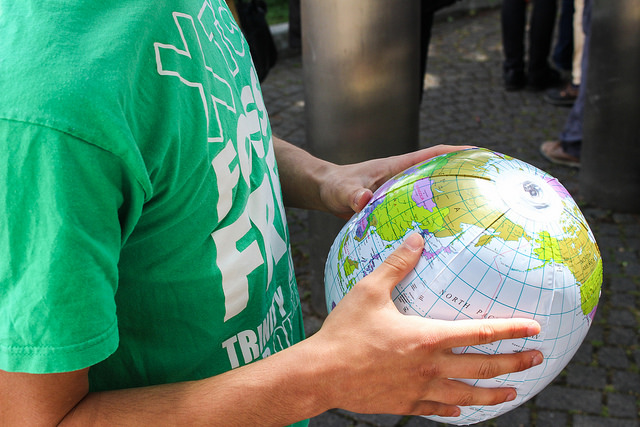This time last year I had never attended a demonstration. I had never marched for education nor striked for repeal. I had shared numerous carefully scripted rants on Facebook lambasting political inaction, but I’d never taken part in any form of direct action myself. Within a few months however, I found myself in the midst of organising Fossil Free TCD and sitting with Provost Patrick Prendergast negotiating Trinity’s €6.1 million divestment.
People & Planet’s “Summer Gathering”, a five-day activist training camp designed to equip students with the tools to campaign for change, was the turning point for me. It was there I found myself pitching a tent for the weekend amongst some of the most inspiring students I have ever met. One was working to relentlessly oppose fracking in their native Yorkshire and another had helped coordinate the largest garment boycott in history. These students were driving social change across the UK. In comparison, my experience policing the comments section of The University Times and sharing dank political memes seemed woefully inadequate in addressing the systemic causes of global inequity, climate devastation and oppression.
Speaking to The University Times by email, Laurence Cox, co-director of the masters in community education, equality and social activism at Maynooth University, highlighted the integral role students in Ireland have also played in the struggle for social justice and equality, pointing to their “long history of being at the forefront of taking action around important issues, often well before most other people are doing so”. He praised the radical action students campaigning on abortion have taken over the last 34 years, citing the most-recent Strike 4 Repeal march earlier this year which took over O’Connell Bridge on International Women’s Day as “something to be proud of”.
Within a few months however, I found myself in the midst of organising Fossil Free TCD and sitting with Provost Patrick Prendergast negotiating Trinity’s €6.1 million divestment
It’s sometimes argued that traditional charities and NGOs are ineffective in enacting social change, dealing with the consequences of injustice rather than tackling the root cause. A quick glance through history reveals that almost every significant social change, from the abolition of slavery to the French Revolution, was brought about through grassroots organising. People & Planet recognise this and essentially act as a facilitator of student activism across the UK and Ireland, empowering students to take action and arming them with the necessary skills to coordinate and build effective campaigns in their local areas, which Cox views as invaluable.
The difference in how Fossil Free TCD was run before and after People & Planet was particularly evident to me. I’d previously tried to get involved but had found it impossible to pierce the somewhat exclusive inner circle that is often commonplace in small campaigns. After attending the festival, we moved to a non-hierarchical structure that helped motivate students who were new to the movement to commit significant time and energy to the campaign, helping to making it an open, collaborative endeavour. Moreover, our team was able to strategise more effectively, mapping out step by step the tactics that we would employ to reach our overarching goal and identifying potential allies that would be key to the success of the campaign.
If we’re going to take on some of the most powerful institutions and vested interests in the country, we’d better be well bloody organised
We intend to return again this year to the People and Planet’s “Summer Gathering” in Manchester from July 5th to 8th, to continue to hone our skills and share what we’ve learned with the community. This time, we’re inviting students from across Ireland, working on a variety of issues from abortion to travellers’ rights to higher education funding, to join us. These skills are too important to be concentrated in a single campaign or a single group. If we’re going to take on some of the most powerful institutions and vested interests in the country, we’d better be well bloody organised.
To encourage as many students from Ireland as possible to come with us this year, we’ve opened applications for three separate scholarships, funded by Trócaire, Gluaisteacht and Trinity College Dublin Students’ Union (TCDSU), to fund the cost of the trip to Manchester for more than 10 students.
Posting an angry status to Facebook, engaging your friends in reasonable debate and changing your personal habits may all feel productive – they certainly did for me. But in order to bring about systemic change, we need to organise strategic grassroots movements.
They may have the money. They may have the power. But we have the people. Let’s use it. Let’s get organising.







